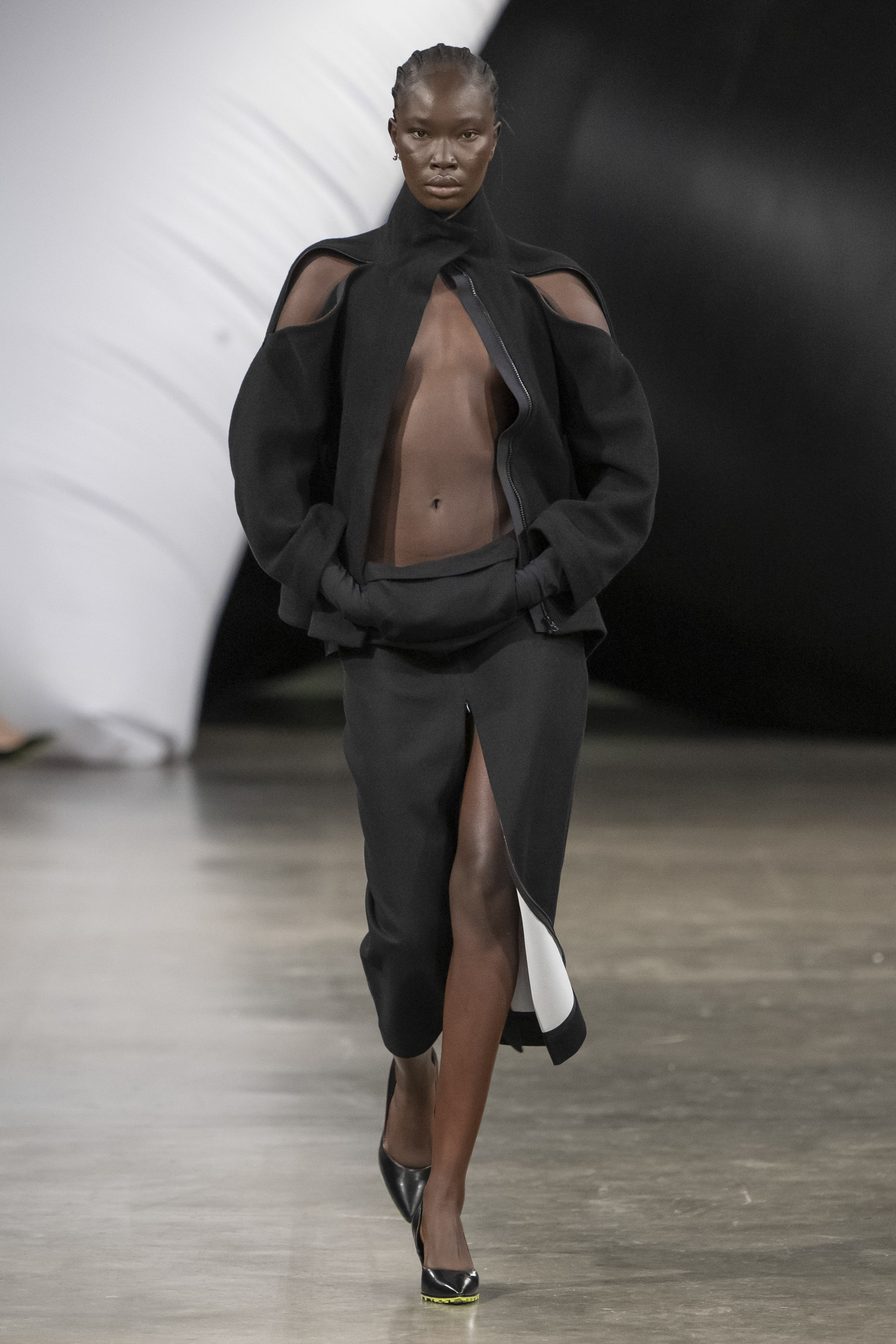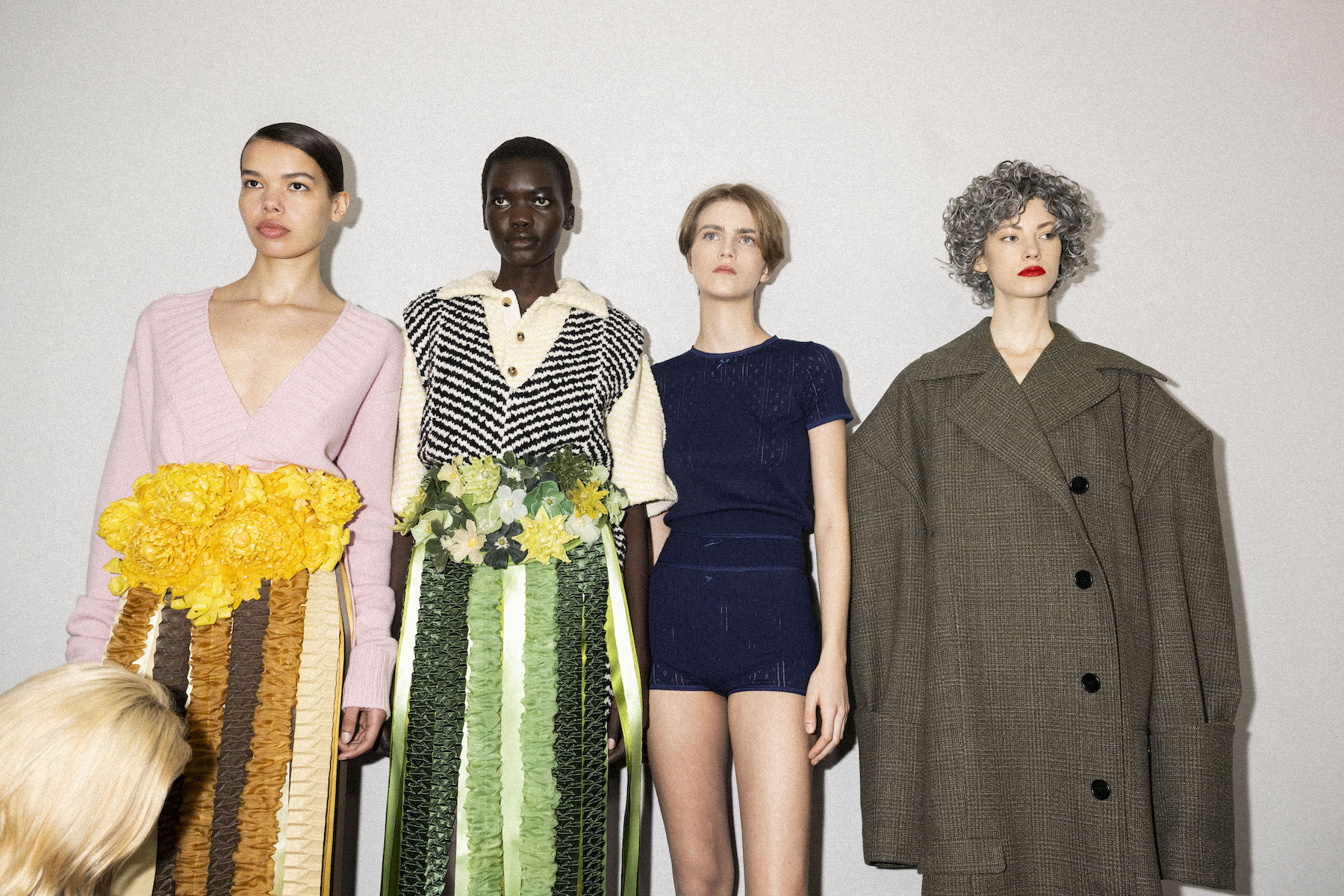
London Fashion Week A/W 2024 heralds the 40th anniversary of the event, which despite earlier iterations, was inaugurated in the early 1980s by British PR maven Lynne Franks (Franks was said to be the inspiration behind Absolutely Fabulous’ Edina Monsoon). Since, the week has held its unique balance of rising stars – perhaps best represented by fashion incubator Fashion East – and the city’s blockbuster names, from Vivienne Westwood to Burberry (and even featured an appearance from Queen Elizabeth II, who attended a Richard Quinn show in 2018).
This latest edition looks set to continue the week’s legacy, beginning on Friday evening with a return to London Fashion Week from historic British house Dunhill after four years (it heralds the arrival of new creative director Simon Holloway). Elsewhere, perhaps the two biggest draws are JW Anderson – its eponymous designer Jonathan Anderson first rose to prominence at Fashion East in the 2010s – and Burberry, where Daniel Lee will show his third runway show for the historic British label. Rounding out the schedule are a mix of the week’s stalwarts, including Molly Goddard, Simone Rocha, Roksanda, Erdem and Ahluwalia, alongside a raft of next-generation talent, from KNWLS, Aaron Esh and Conner Ives to the Central Saint Martins MA fashion show.
Here, reporting live from the shows, Wallpaper* fashion features editor Jack Moss rounds up the best of London Fashion Week A/W 2024.
The best of London Fashion Week A/W 2024
JW Anderson
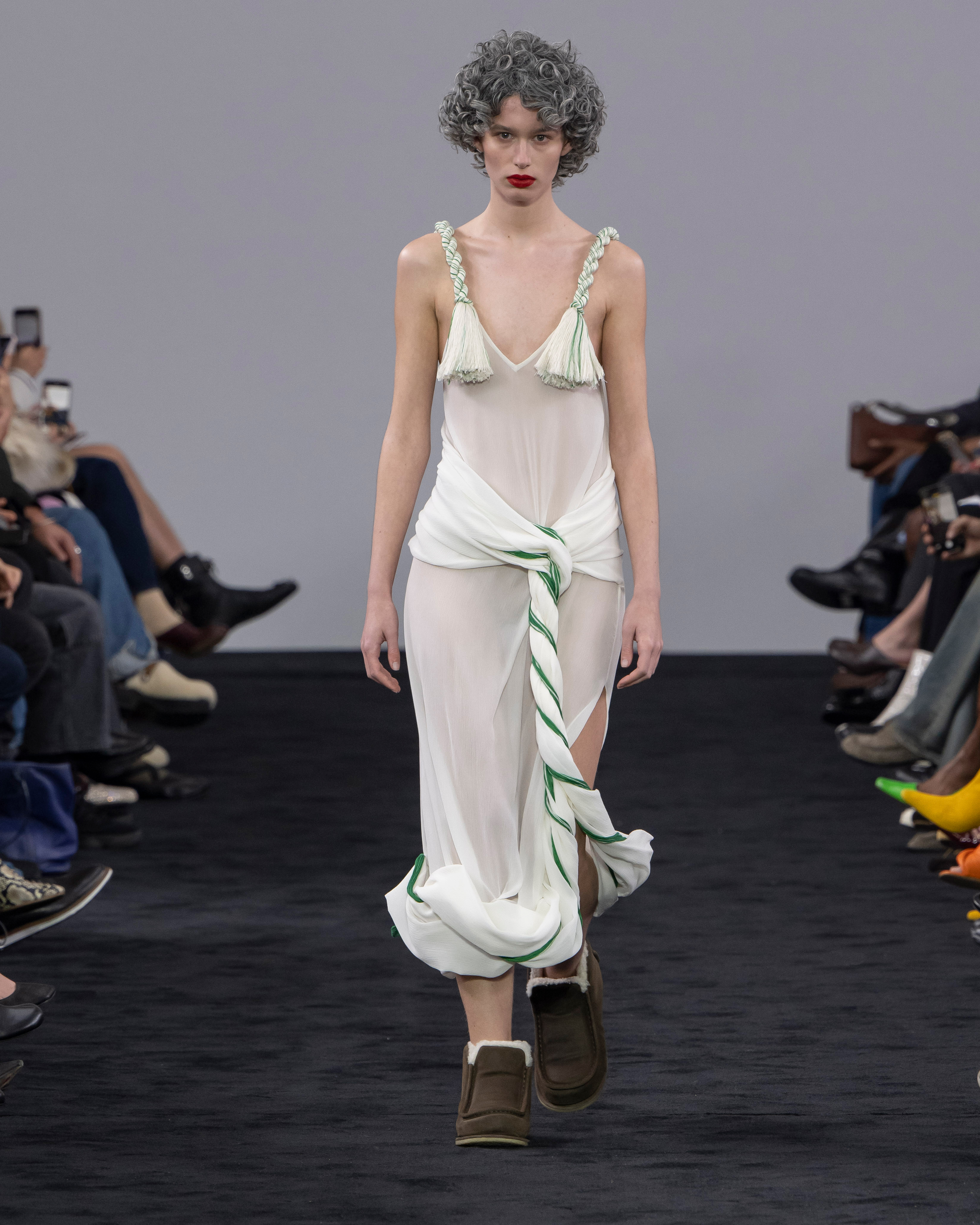
Nosy neighbours, M&S knickers, horse riding trophies – after the show, Jonathan Anderson laid out the nostalgic inspiration points for his A/W 2024 collection, presented this season at Marylebone’s Seymour Leisure Centre in a shift from The Roundhouse. ‘It was something twisted, in terms of the woman next door,’ he said, a mood elaborated in the press release as ‘a grotesque everydayness, in grotesque distortions and proportions’. So there were knit dresses with enormous stitches, trails of blown-up haberdashery adornments, layers of everyday ribbed underwear and vests, house slippers, and brassy grey curly wigs. In its strange banality it was surprisingly affronting, a further demonstration of Anderson’s ability to traverse the seductive and the ugly (the designer is perhaps only equalled by Miuccia Prada in his ability to strike this dichotomy so successfully season on season).
Other pieces were designed to recall interiors, like a series of twisted dresses which evoked curtains and curtain ties, looping elegantly around the model’s bodies (their evolution into a version in pearl made for a convincing proposition for a contemporary wedding gown). Outerwear recalled British heritage styles, here blown up in size and slightly dishevelled, pulled up at the sleeve to reveal the lining beneath, while everyday staples like the striped sweater and sweatpant shorts appeared throughout. Anderson elaborated backstage that it was in part a consideration of Britain, a strange refraction of the country’s past – at once nostalgic and subverted, likening it to the slew of recent songs that have risen up the charts years after they have been released.
‘Young people are discovering nostalgia,’ he said. ‘And then they glorify [things from the past], and it becomes a kind of future thinking in a didactic way. They’re like mixing things that my parents know, that we all know, and reconfiguring them. It makes nostalgia not such a scary thing.’
Simone Rocha
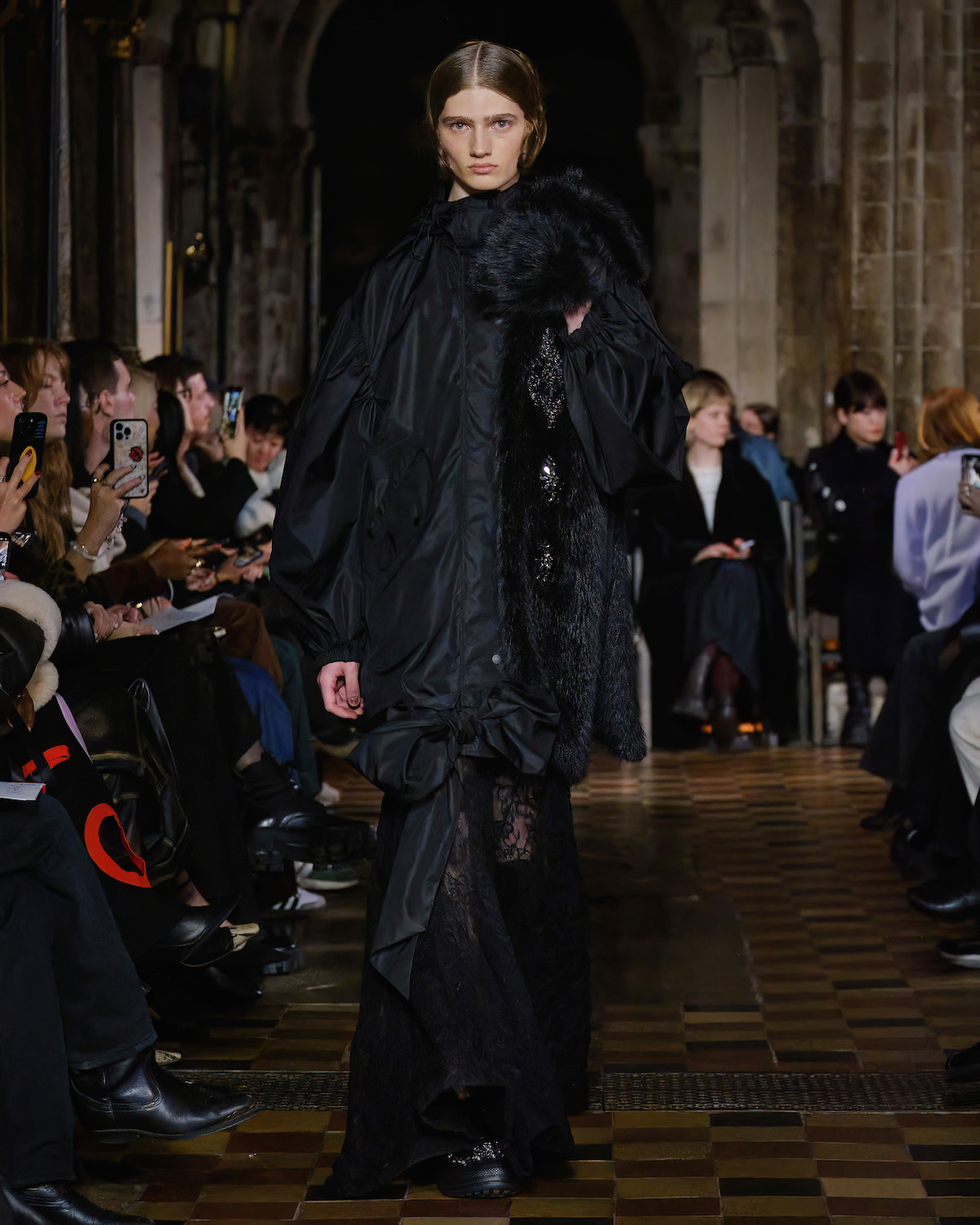
Simone Rocha described her A/W 2024 collection as the closing chapter of a triptych of works which began with last season’s ‘Dress Rehearsal’ – capturing the anticipation and fraughtness of the evening before a wedding – and continued with the designer’s haute couture collection for Jean Paul Gaultier shown in Paris last month, which was titled ‘The Procession’ and looked towards the nuptials themselves. Presented in medieval church St Bartholomew-the-Great in Smithfield, the conclusion was titled ‘The Wake’, with Rocha beginning the collection by looking towards the mourning attire of Queen Victoria after the death of her husband Prince Albert (famously, she would mourn the loss for over four decades of her life). It made for fertile ground for the Irish designer, whose collections have long had a swelling undercurrent of darkness despite the beauty of their execution. Here, pelts of faux fur sat on the shoulders of delicate, near-transparent tailoring, while corsets – adorned with shimmering crystal embellishment under the chest – seemed a continuation of her collaboration with Gaultier. Unexpected accessories came in the shape of soft-toy lambs carried in the models’ arms, a nod to the mythical animals which serve as church guardians, while mourning blacks were reimagined in tie-hem anoraks, worn with faux-fur stoles adorned with crystals. ‘This was the final piece of the triptych, because I was working on these collections at the same time,’ explained Rocha backstage. ‘I’ve been looking at a lot of preserved garments, a lot of archives, and I really wanted to take that and place it today.’
Molly Goddard
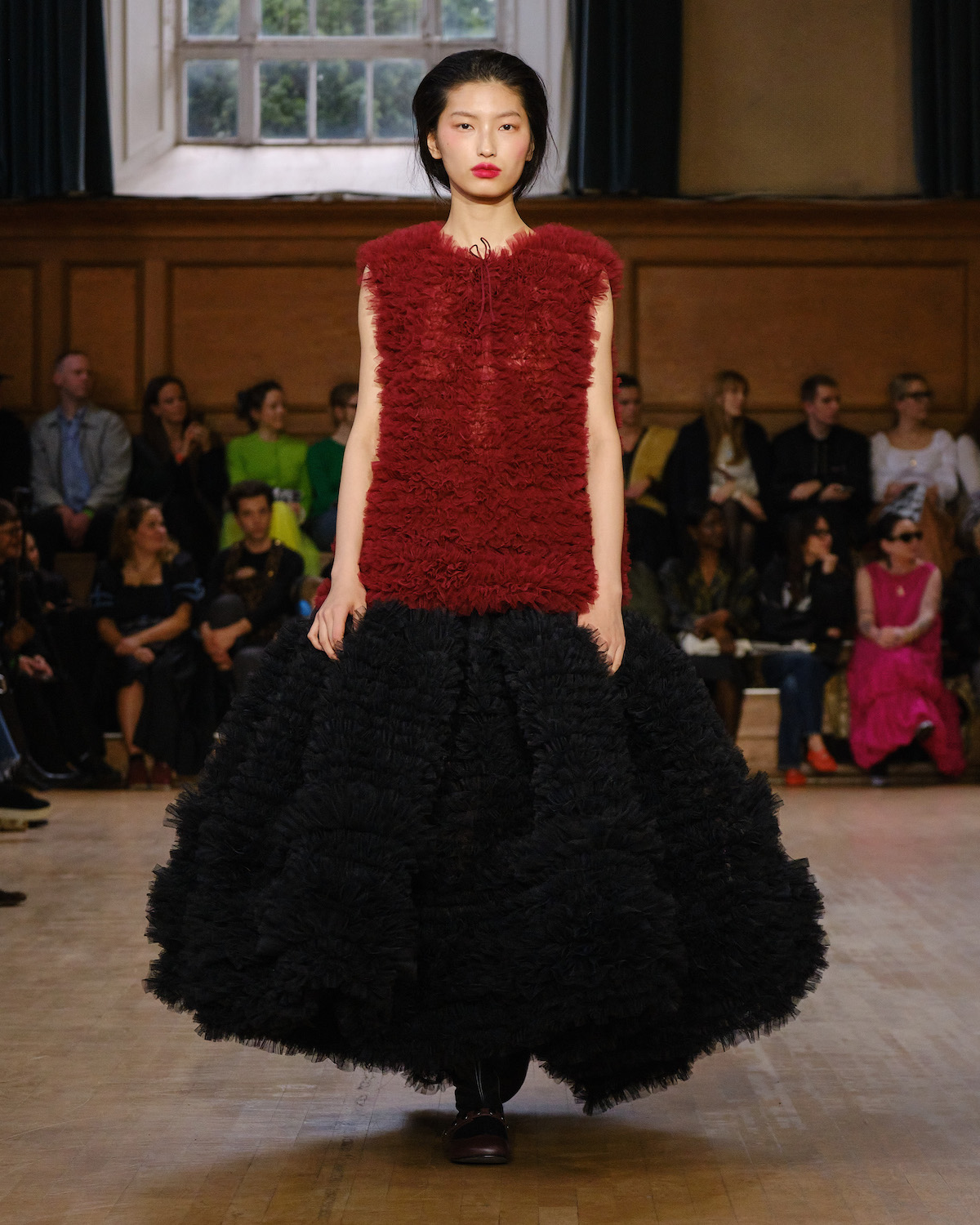
A vast mural by London Group artist Ivon Hitchens provided the colourful backdrop for Molly Goddard’s latest collection, staged at the main hall of Cecil Sharp House, the home of the English Folk Dance and Song Society in north London. The collection itself reflected the work’s freewheeling composition – Hitchens took three years to complete the 1954 mural, which depicts a mass of abstract figures dancing in a mythical woodland – with Goddard noting that this season she once again began the collection with an ‘experimental fitting’. In these, the designer takes vintage pieces, samples from her archive and toiles and begins to combine them as a starting point for the collection (she also noted inspiration from her eBay watch list, which with two young children is currently comprised of colourful baby and toddler wear). Here, it led her to a consideration of form – ‘shapes on top of shapes; garments combining – pulling in, pushing out, smushing’ – in part inspired by the haute couture silhouettes of Cristobal Balenciaga and Christian Dior, though relaxed with elasticated and tie fastenings for the everyday. Meanwhile, a continuing exploration of tulle – this season, Goddard described their construction as ‘blobs’, tightly ruffled shapes which provided dramatic silhouettes across skirts, shirts and dresses – met slouchy sweaters, cowboy jackets and polka-dot tops and bustiers in a collection of refreshing levity.
Roksanda
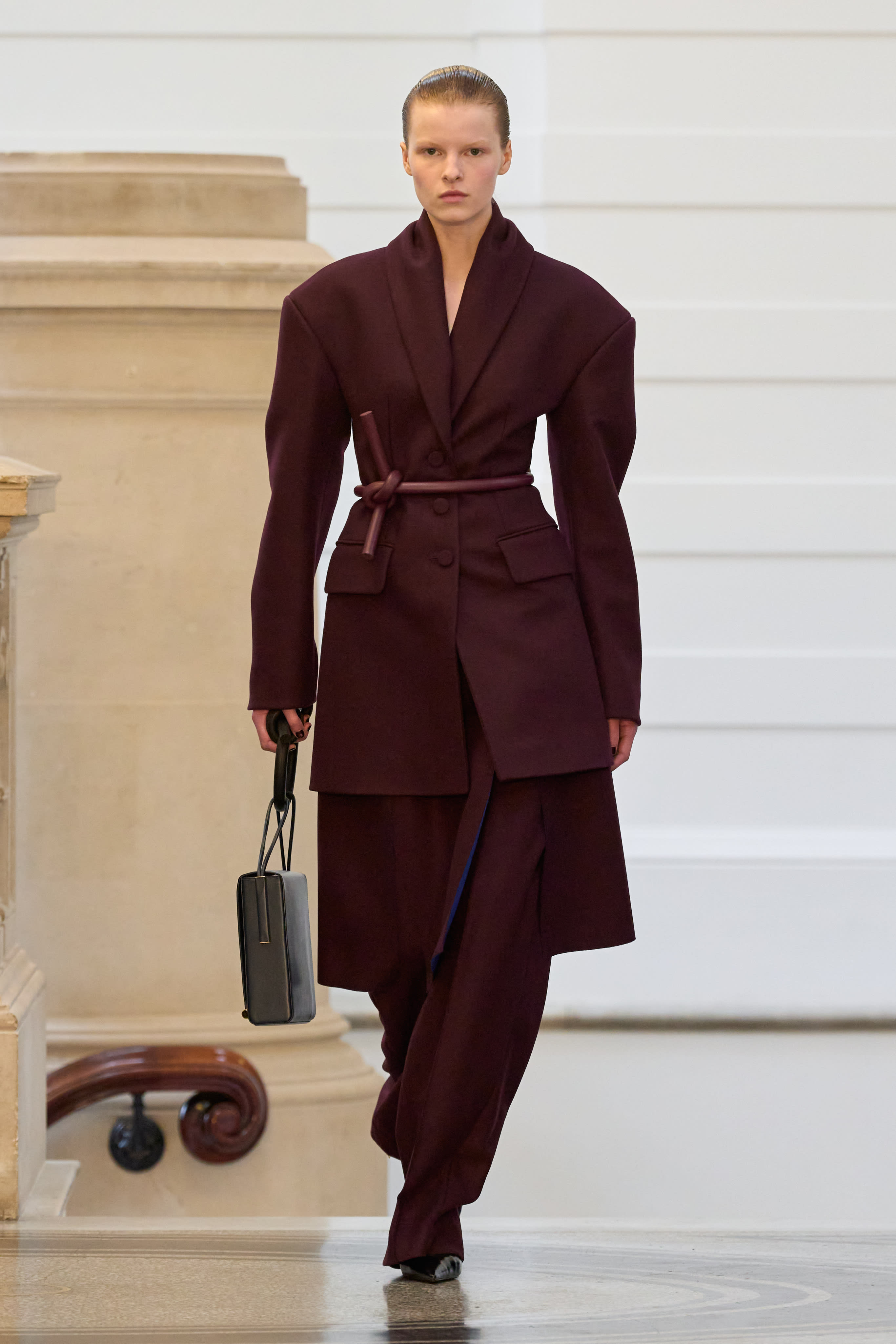
Earlier this week, Zendaya wore a Roksanda look to Dennis Villenvenue’s Dune: Part Two London premiere: a plum-hued suit, jacket nipped in at the waist with exaggerated shoulders and loose-cut trousers, layered with a knee-length skirt. It turned out this was a sneak preview of the A/W 2024 collection presented yesterday, against the backdrop of the Tate Britain. (The suit opened the show with Law Roach, the actor’s stylist, watching on from the front row).
This season Ilinčić said she had been inspired by Le Corbusier, one of the Serbian-born designer’s ‘heroes’, and that she had recently spent time at the architect’s tiny holiday cabin, Cabanon de Le Corbusier. It was constructed in 1951 and located in Cap Martin, a coastal commune in the South of France. The interiors, and most notably the murals in the entrance hall, were subsequently referenced in the tapestries swathing around the body and trailing dramatically along the runway. Melton wool, a fabric ‘used in interiors and homes, places that provide refuge and comfort’, formed the opening suit and additional tailored pieces, where boucle, fil coupé jacquard, and a smattering of faux fur also lent themselves to the embrace of soft furnishings.
Roksanda is renowned for her considered use of colour, and of course, A/W 2024 was no different. The show notes reeled off a descriptive list of shades, reminiscent of the names that one might find on tins of expensive emulsion: Chartreuse-Verse, Canvas, Dark Flamant, Grey-Melange, Bleu-Cair, Pale-Lime, Light Hibiscus, Antique Rose, Peche-Clair. There were also sportier nods to windbreakers and wellingtons (footwear was produced in collaboration with Fit Flop), with the closing looks of the show taking the form of huge taffeta dresses that appeared almost tent-like, as though held up with a framework of poles. They conjured the idea of spending a windswept day along the coast, before returning to the warmth of a lavishly decorated home. Hannah Tindle
16Arlington
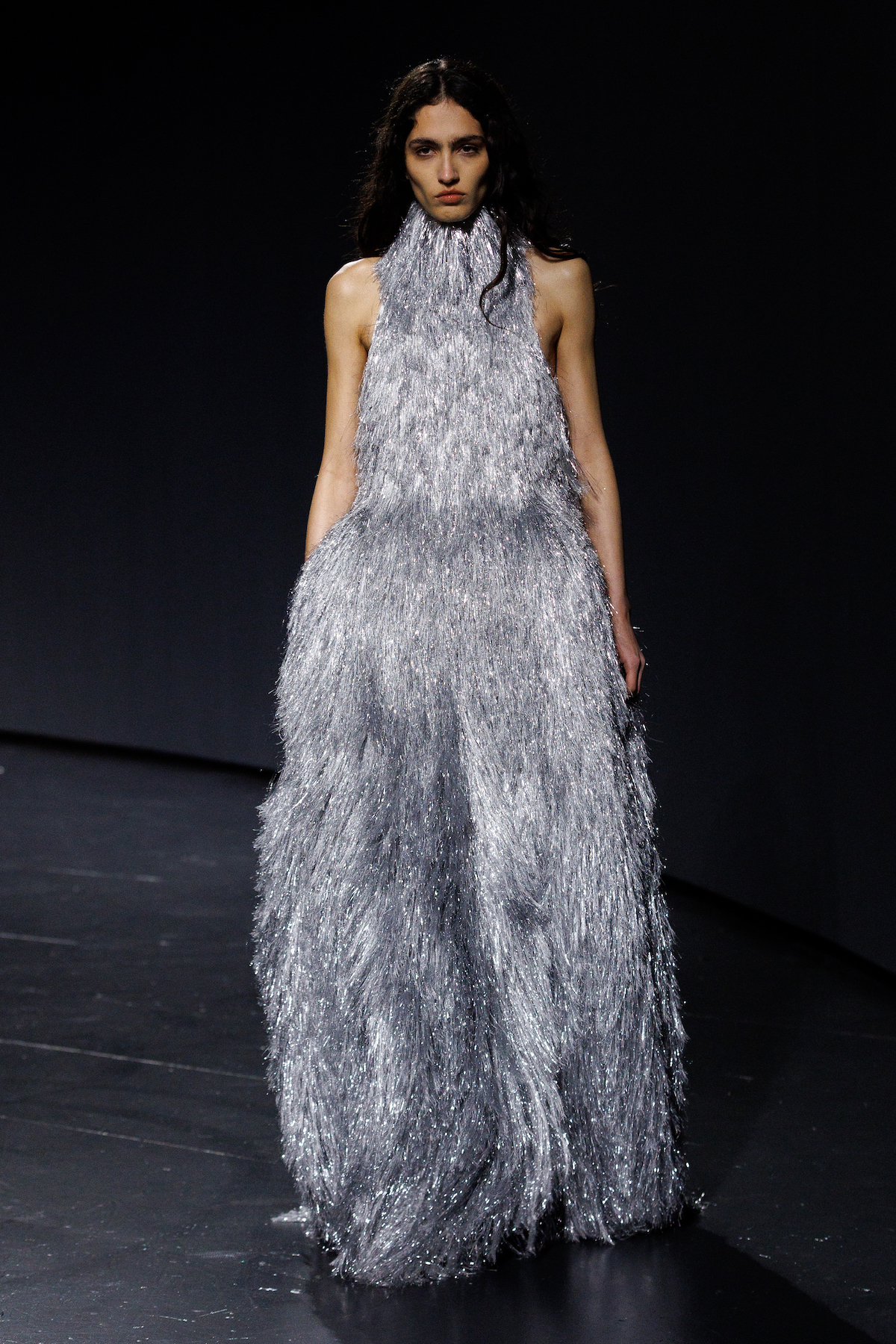
Writer and curator Charlie Fox’s 2019 exhibition My Head is a Haunted House, presented at Sadie Coles gallery, provided the starting point for Marco Capaldi’s A/W 2024 collection for 16Arlington. At the time, the group show was described by Fox as an attempt to recall ’the hallucinogenic memory’ of a childhood obsessed with werewolves, bats and monsters; here, Capaldi gave the monstrous a more elegant twist, seeing his sharp, streamlined vision for the brand enlivened with flourishes of strangeness, like swathes of shaggy faux fur or the clattering tinsel looks which closed the show. A pair of diaphanous white dresses, meanwhile, seemed to conjure Frankenstein’s bride, while shirts and sweaters tied around the neck in lieu of scarves suggested a mash-up of parts. ‘It’s not about Halloween – it’s about human nature,’ Capaldo said. ‘Hence the title of the show, I’m Not Sorry, It’s Human Nature, borrowed, of course, from Madonna. Those who go against conventions are often ostracised, but there’s so much strength and power and beauty in rejecting norms. These are the people I design for.’
Dunhill
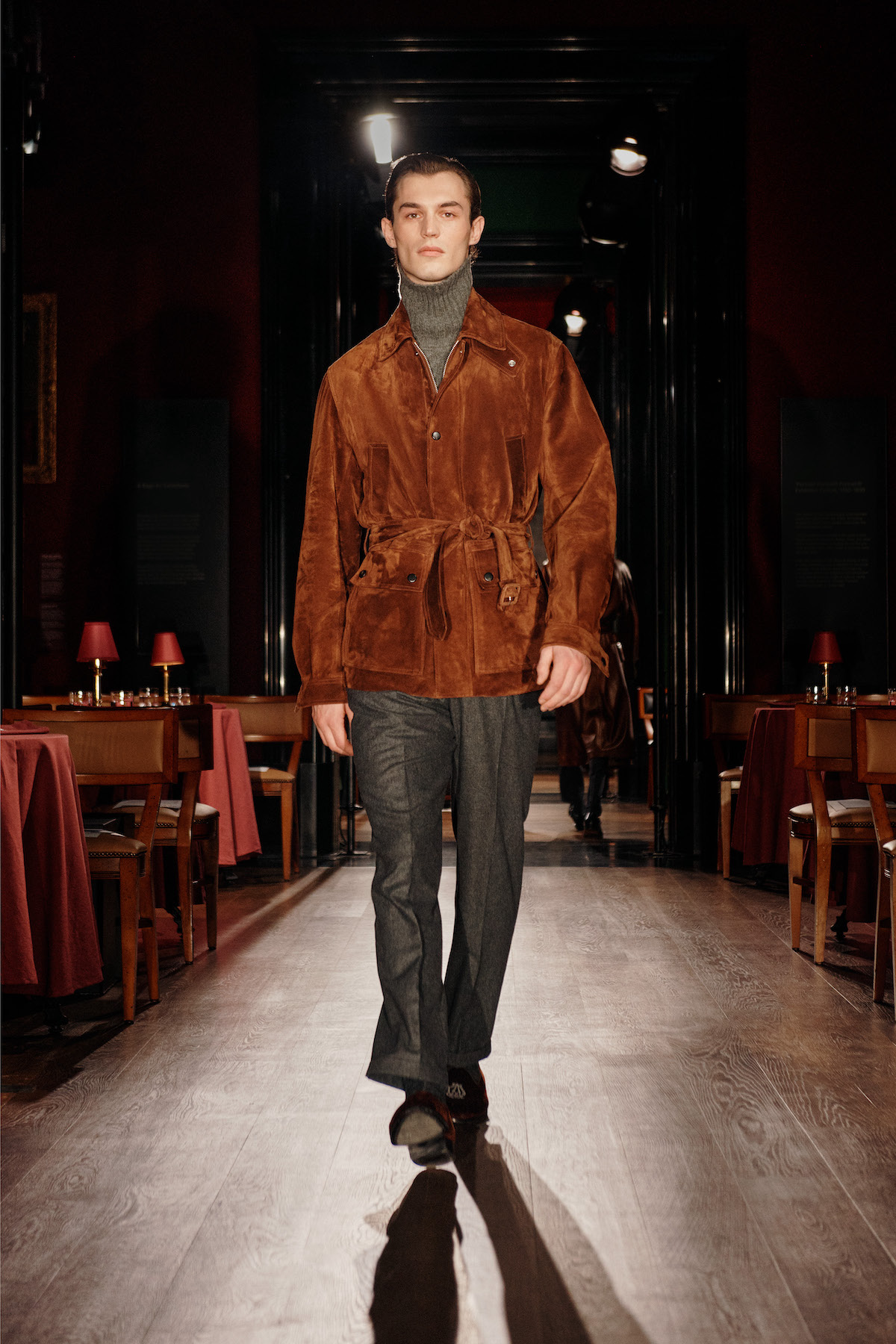
For its first runway show since 2020 – and the first collection from newly installed creative director Simon Holloway – Dunhill chose the Duveen Wing of the National Portrait Gallery, a series of rooms inaugurated by King George V and Queen Mary in 1933. The historic venue hinted a return to classicism for the British brand (itself in its 130th year), a mood also captured in show’s the layout, which with its low-lit individual tables, gin martinis and dainty plates of cucumber and caviar sandwiches nodded towards traditional salon-style fashion presentations of the early 20th century.
’This collection celebrates our origins and subsequent evolution into a unique British luxury house,’ explained Holloway of the A/W 2024 collection, which sought to capture Dunhill’s rich tailoring heritage and tradition of dressing figures from stage and screen (earlier in the week, the brand hosted a star-studded pre-BAFTA party, a hint towards this new direction). So the collection itself ran the gamut of what Holloway called the ‘finer things in life’ – whether motor racing (recalled in the suede field jacket worn by model Kit Butler, or the leather driving gloves throughout), jaunts to the great outdoors (gabardine chinos, blazers in heritage checks and cord, aran-stitch cashmere sweaters) or a swathe of evening wear, including an elegant ivory riff on the tuxedo with matching bowtie and overcoat (worn here with a sneaker).
‘[These are the things] we have always done best,’ concluded Holloway of the collection, which felt like something of a palette cleanser for his tenure ahead. ‘I hope we have re-captured that spirit, one that is at once refined and international,’
Fashion East
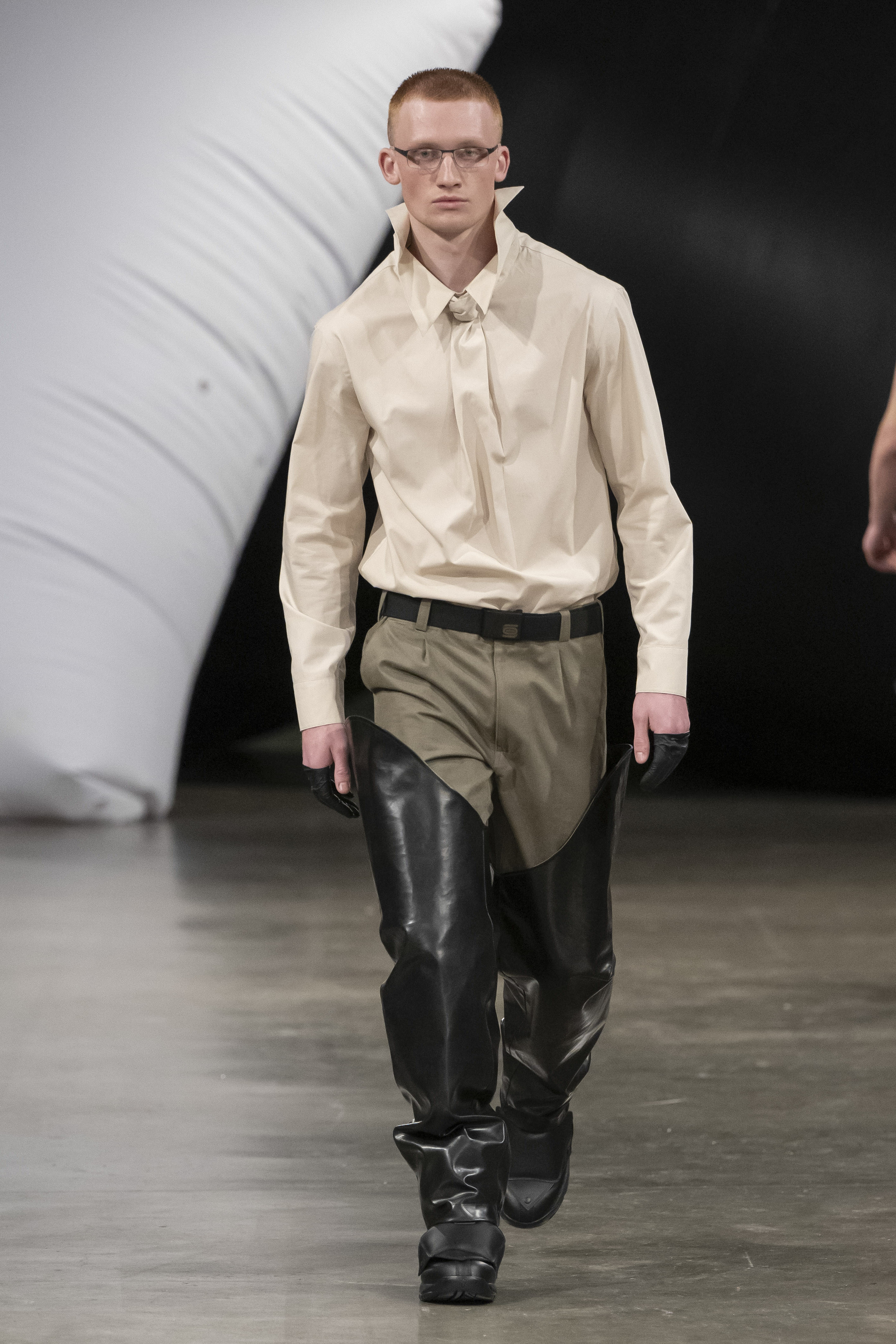
There was an interesting synchronicity to this season’s Fashion East designers Olly Shinder and Johanna Parv – the latter in her third and final season at the talent incubator – who both provided their own distinct riffs on the nine-to-five wardrobe. Shinder, who last season presented a debut collection of pieces inspired by the sporty, sleazy nightlife uniforms of Berlin and London, where the designer splits his time. Soundtracked once again by photographer Wolfgang Tillmans, here Shinder turned his attention towards the corporate uniform, which was ‘queered... displaced, subverted and refined’. So there was a take on ’middle managerial’ shirting, which appeared to have been grasped at the collar and sliced down the back, while other pieces continued Shinder’s more familiar exploration of workwear, with clean-lined functional sets with PVC at the sleeves and over the trousers, as if models were about to deal with hazardous materials (indeed, Shinder likened his studio this season to a lab). Completing the lineup were pieces primed for the dance floor: slick, semi-shirted latex bodysuits, or abbreviated mini shorts in black and silver. Judging by buzz, he already has an audience for these clothes.
Parv, meanwhile, is a designer who looks towards the functionality of sportswear through toggle and adjustable fastenings, and technical fabrics, attempting to replicate them across the full gamut of a woman’s wardrobe. This season, a polished collection continued this approach with what she said was inspired by the ‘topography of the city’, and the demands of urban life. The mood was darker, and more sensual than previously – the skirt suit was sliced open at the front and shoulders – while zip-up mini dresses were featherweight in their fabrication. As ever, a series of clever accessories accompanied in the form of leather bumbags and handbags with an adjustable nylon strap, evocative of those found on a backpack. It will be interesting to see what Parv does next.
